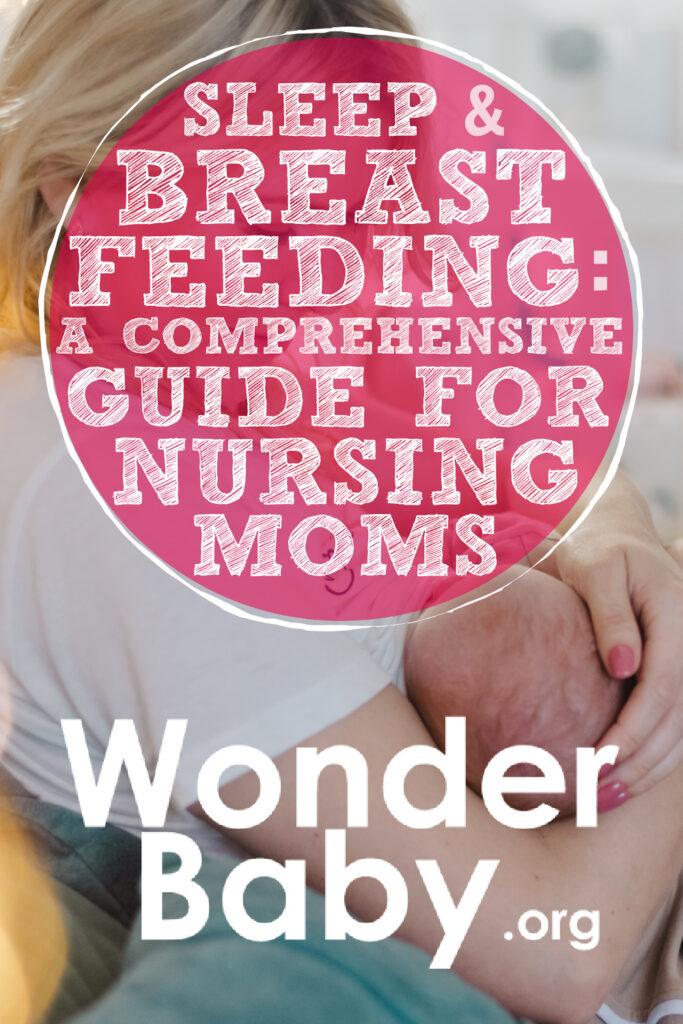Sleep and Breastfeeding: A Comprehensive Guide for Nursing Moms

- Newborns sleep for up to 18 hours a day, though you’d never know it if you only saw them at night.
- Sleep deprivation is hard on everyone, and you’ll want to ensure your baby gets as much sleep as possible.
- Breastfeeding is associated with longer total sleep durations but more wakeups at night.
- Keeping the environment night-like during night feeds can help your baby gently ease back to sleep.
Many new parents are surprised by the crushing tiredness of new parenthood. While newborn babies get plenty of sleep, their parents do not. Newborns aren’t familiar with day and night and instead simply sleep whenever the mood strikes.
There is an unrelenting myth that breastfeeding creates bad sleepers. This is not true. In fact, science says breastfeeding positively impacts both baby and maternal sleep. Don’t listen to the nay-sayers who tell you breastfeeding is to blame for your eye bags.
Though they may seem an unlikely pair, breastfeeding and sleep training can both co-exist to gently ease your baby into a better sleep pattern without stopping breastfeeding. Sleep training a breastfed baby doesn’t need to be harsh; it can be a gentle nudge in the right direction.
Understanding the Sleep Patterns of Newborns

Newborns are not famed for their love of sleeping at night. One thing all new parents have in common is tiredness. Even if your baby naps great during the day, their night waking habits are likely to be causing you (sleep deprivation) headaches.
Infant Sleep Cycles
Newborns sleep for up to 18 hours a day, but usually not when you want them to. Newborn babies have not yet developed a strong circadian rhythm, which means they don’t have a great desire to sleep at night. Newborns have two parts to their baby sleep cycle: Rapid Eye Movement (REM) and Non Rapid Eye Movement (NREM). They spend a roughly equal amount of time in each type of sleep.
By around three months of age, babies exhibit four distinct sleep stages, much like those experienced by adults. However, it will be a few more years until your child spends as long in each stage as adults. Unlike adults, babies enter the REM stage of sleep soon after falling asleep.
Your baby’s sleep cycles may only last around 50 minutes. Some babies need help getting back to sleep between cycles. Observe your baby carefully to ensure they are fully awake before you swoop in to offer help. It’s possible you may be disturbing your baby unnecessarily when they could have gently eased back to sleep on their own.
The Impact of Breastfeeding on Sleep

There are many benefits to breastfeeding, from easy bonding to convenience and affordability, but is breastfeeding good for sleep? Some people may argue no and try to get you to introduce a bottle, but what are the facts regarding breastfeeding and sleep?
Benefits for the Baby
- Longer sleep duration: A 2012 study published in the American Journal of Clinical Nutrition11. Abdul Jafar, N. K., Tham, E. K., Pang, W. W., Fok, D., Chua, M. C., Teoh, O.-H., Goh, D. Y., Shek, L. P.-C., Yap, F., Tan, K. H., Gluckman, P. D., Chong, Y.-S., Meaney, M. J., Broekman, B. F., & Cai, S.. Association between breastfeeding and sleep patterns in infants and preschool children. The American Journal of Clinical Nutrition. 2021;114(6), 1986–1996. https://doi.org/10.1093/ajcn/nqab297 found that breastfed babies had overall longer night and total sleep durations, though they had more frequent night wakings. So, while your sleep may be disrupted by your breastfed infant, they’re likely to get plenty of sleep overall.
- Reduced SIDS risk: Exclusive breastfeeding reduces the risk of Sudden Infant Death Syndrome22. Thompson, J. M. D., Tanabe, K., Moon, R. Y., Mitchell, E. A., McGarvey, C., Tappin, D., Blair, P. S., & Hauck, F. R.. Duration of Breastfeeding and Risk of SIDS: An Individual Participant Data Meta-analysis. Pediatrics. 2017;140(5). https://doi.org/10.1542/peds.2017-1324. The longer you exclusively breastfeed your baby, the lower their risk becomes.
Benefits for the Mom
- Better sleep: When you breastfeed, prolactin is released into your bloodstream. This important hormone promotes sleep, allowing you to fall asleep more easily after a feed. A 2022 study published in Frontiers in Nutrition33. Ruan, H., Zhang, Y., Tang, Q., Zhao, X., Zhao, X., Xiang, Y., Geng, W., Feng, Y., & Cai, W.. Sleep duration of lactating mothers and its relationship with feeding pattern, milk macronutrients and related serum factors: A combined longitudinal cohort and cross-sectional study. Frontiers in Nutrition. 2022;9. https://doi.org/10.3389/fnut.2022.973291 investigated maternal sleep during 2-4 months postpartum. The researchers found that breastfeeding was associated with longer sleep duration, while formula feeding may reduce maternal sleep.
- Bonding: Breastfeeding is nature’s way of encouraging bonding between mother and baby. The close contact, the love hormones, and the loving gaze into your baby’s eyes as they feed are all nature’s way of ensuring you bond with your new baby.
Practical Tips for Syncing Sleep with Breastfeeding

When it comes to sleep training a breastfed baby, it is important to teach them the difference between night and day. While it may take your baby a while to understand that night is for sleep, there are ways you can encourage them to stay sleepy during night feeds by creating a sleep-friendly environment for breastfeeding.
Keep the Room Calm and Dark
It might not sound like traditional sleep training, but a calm, dark room is important for sleep training young babies. If you want your baby to sleep longer, don’t introduce daytime concepts like the big light, loud talking, or the television’s noise (and glare). Staying calm and quiet during night feeds can increase the likelihood of your baby falling asleep.
Another bonus is that a calm, dark room will make it easier for you to fall asleep. Resist the lure of electronics and caffeine during night feeds, and you’ll hopefully get more sleep, too.
Find Comfortable Seating and Positioning
Make sure you find a comfortable position to feed your baby, making night feeds more bearable. There’s nothing worse than aches and pains during night feeds. Whether this is a side sleeper that allows you to feed lying down or a comfortable breastfeeding chair next to your baby’s sleep space, comfort is key in night feeds.
Try a Side-Lying Breastfeeding Position
If you can master the side-lying breastfeeding position, night feeds won’t feel like such a chore. Firstly, get comfy on your side; you should lie tummy to tummy with your baby. Ensure your baby’s ear, shoulder, and hip are in a straight line. Tuck your underneath arm under your head, and use your free arm to guide your baby’s head to the breast gently.
Understand Your Baby’s Cues
Understanding your baby’s cues can make night wakings much easier to deal with. If, for example, you observe your baby smacking their lips, you can immediately offer the breast before they start crying. Responding to a baby’s cues early means they don’t need to cry to get what they want. If your baby doesn’t need to cry to get milk, they may find it easier to settle back to sleep after feeding.
Be Prepared for Cluster Feeding
If your baby spends hours on the breast each evening, welcome to cluster feeds. When cluster feeding, it might feel like your baby is attached to you all evening. Though it can be frustrating for you, cluster feeds are an expected part of breastfeeding. Many moms notice that their babies sleep better after an evening of cluster feeding, so it may be that your little one is filling their tummy up so you can get some sleep.
Overcoming Common Challenges

Breastfeeding isn’t always easy, and you may encounter challenges along the way. To keep happily breastfeeding both day and night, you may need to deal with the following problems:
Night Waking
It is normal for young babies to wake up at night. This may be because they have ended a sleep cycle and are about to enter another. They may not need your help to return to dreamland, so observe them quietly to see if they fall asleep independently.
Sometimes, babies wake in the night because they are hungry. Learn your baby’s hunger cues to understand your baby’s behavior in the middle of the night. Your baby may wake if they are too warm or too cold or if their diaper needs changing. Even a gassy tummy could be keeping your baby awake at night. Try burping your baby to see if that helps.
Contact their pediatrician for advice if you are worried about your baby’s night wakings. They will be able to assess whether your baby has underlying issues that are causing them to wake frequently or whether it is simply normal newborn behavior.
Sleep Regression and Growth Spurts
Life with a baby is filled with sleep regressions and growth spurts. Just when you think you’ve got the hang of something, life will throw a sleep regression your way to turn your world upside down.
Unsurprisingly, growth spurts often come hand-in-hand with an increased appetite. You may notice your baby feeds more frequently during growth spurts. Sleep regressions may also coincide with extra night feeds. Moms often notice that the four-month sleep regression, in particular, leads to more night feeds.
Try not to worry too much about how often your baby wants to feed. As long as your baby grows and produces plenty of wet and dirty diapers, they are likely getting enough to eat. Trust your baby’s natural instinct and offer feeds whenever they show signs of being hungry.
Around the age of four months, your baby may show more interest in the world. Though this is an amazing stage of curiosity, it can also mean lots of interrupted feeds when your baby suddenly abandons your nipple to see what’s happening at the next table. During this fussy period, it may help to feed in a calm, private space with fewer distractions.
Lack of Support
Sadly, lack of support is a stumbling block encountered by many breastfeeding moms. If you encounter breastfeeding difficulties, reach out for help. Contact your healthcare provider for breastfeeding support. There may be a local breastfeeding peer support group you can attend.
When we talk about support, we don’t always mean professional support. The support from your partner and others around you is just as important. Find other breastfeeding mothers to connect with, and educate your loved ones about why breastfeeding is so important to you. Make sure your partner knows how to best support you on your breastfeeding journey (by bringing you more cookies, of course).
Establishing Healthy Sleep Habits

You don’t need a strict sleep routine with exact rest times, but creating healthy sleep habits for your family is worthwhile.
For the Baby
Newborn babies do not understand day or night, so they’ll simply grab sleep when needed. As your baby grows, however, they will learn to do most of their sleeping at night. To help this process along, you could:
- Introduce a bedtime routine: A bedtime routine isn’t a race to bedtime; it’s a series of gentle hints to your child that bedtime is approaching. Your baby’s bedtime routine should be relaxing and enjoyable, encouraging bonding between you and your baby. You may want to include a bath, a baby massage, and some bedtime stories into your nightly routine.
- Differentiate between night and day: If you want your baby to understand it’s nighttime, keep the lights dim during night feeds. Keep the calm, darkly lit environment going once it’s after your baby’s bedtime, and hopefully, they’ll soon figure out that means it’s time to sleep.
For the Mom
Here are some tips to help you with sleep deprivation:
- Sleep when you can: As a Mom, you don’t have the luxury of eight undisturbed hours of sleep at night, so grab your sleep whenever you can. If your baby goes down for a nap, you can use this time to sleep. Treat yourself to a lie-in if your baby is happy with your partner at 6 am. Don’t see sleep as lazy; you must sleep to be your best self for your baby.
- Lower your expectations: Tiredness is unavoidable when you have a newborn baby. It will help to lower your expectations for yourself during this period. No, the house doesn’t have to be spotless, and no, you don’t have to be firing on all cylinders. You’re running on depleted energy levels, so spend your energy wisely.
- Remember that night wakings are normal: If you constantly wait for your baby to sleep through the night, you’ll likely feel frustrated when they don’t. Instead of thinking of sleeping through the night as something your baby should be doing, try to focus instead on the normality of a baby waking through the night. Yes, parenthood would be much easier if babies could sleep through the night from day one, but sadly, that’s not a realistic goal.
- Get your partner on board: Make sure your partner is doing their fair share. While they may not have the breasts for breastfeeding, there are plenty of other things they can do to care for you and the baby. Set out exactly what you need them to do. Whether you want them to take over the night feedings and give bottles of expressed breast milk so you can get some restful sleep, wake up to keep you company when you’re exhausted, or get up early with the baby so you can catch up on sleep, tell them your expectations.
- Accept help: Don’t be afraid to ask for help from your support network. Reach out to grandparents, aunts and uncles, best friends and ask for help. You’ve likely received offers of help, so cash those in now. Accept help whenever and wherever it is offered. Visitors can help by bringing groceries, folding laundry, and washing up before they leave. It isn’t rude or overbearing to accept offers of help; any parent remembers vividly how tough those early days of parenthood can be.
Life can feel tough if your baby isn’t sleeping through the night. You may be suffering from brain fog, irritability, and bone-aching exhaustion. Remember, though, not only is it normal for babies not to sleep through the night, but this stage will be over one day. One day, you will wake in the middle of the night and find your baby sleeping soundly beside you. One day, you’ll take a full night’s sleep for granted again.
References
- Abdul Jafar, N. K., Tham, E. K., Pang, W. W., Fok, D., Chua, M. C., Teoh, O.-H., Goh, D. Y., Shek, L. P.-C., Yap, F., Tan, K. H., Gluckman, P. D., Chong, Y.-S., Meaney, M. J., Broekman, B. F., & Cai, S. (2021). Association between breastfeeding and sleep patterns in infants and preschool children. The American Journal of Clinical Nutrition, 114(6), 1986–1996. https://doi.org/10.1093/ajcn/nqab297
- Thompson, J. M. D., Tanabe, K., Moon, R. Y., Mitchell, E. A., McGarvey, C., Tappin, D., Blair, P. S., & Hauck, F. R. (2017). Duration of Breastfeeding and Risk of SIDS: An Individual Participant Data Meta-analysis. Pediatrics, 140(5). https://doi.org/10.1542/peds.2017-1324
- Ruan, H., Zhang, Y., Tang, Q., Zhao, X., Zhao, X., Xiang, Y., Geng, W., Feng, Y., & Cai, W. (2022). Sleep duration of lactating mothers and its relationship with feeding pattern, milk macronutrients and related serum factors: A combined longitudinal cohort and cross-sectional study. Frontiers in Nutrition, 9. https://doi.org/10.3389/fnut.2022.973291

Related Posts

Sleep, Special Needs
Safe Place Bedding Travel Bed Review
Traveling with a special needs child can be stressful! Having a safe, durable, and easy to use travel bed can make traveling so much easier!

Sleep, Special Needs
Sleep Regimen for Premature Babies: Special Considerations
It can take premature babies much longer than their full-term peers to sleep for long stretches. A preemie sleep schedule may encourage better sleep.

Sleep
Mastering the Bedtime Routine: 3 Tips for a Peaceful Night’s Sleep
From around six weeks, a newborn bedtime routine can help your baby learn the difference between day and night and prepare for a restful night’s sleep.